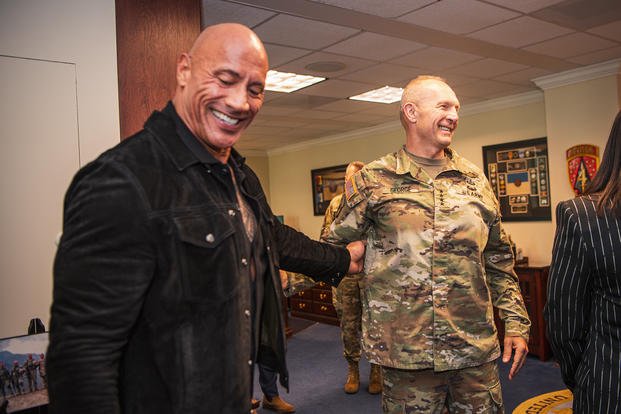The Army is seemingly having buyer's remorse after an $11 million marketing deal with the United Football League and Dwayne "The Rock" Johnson.
The high-dollar, high-profile deal likely didn't lead to a single new Army recruit and may possibly have had a negative impact on finding new enlistments, internal documents and emails reviewed by Military.com show. The service may even seek to get some of its money back.
The Army inked the deal earlier this year with the UFL, the upstart minor league alternative to the NFL that had an inaugural season from March through June with a disappointing debut. More importantly, the deal included Johnson, a global superstar and owner of the league, who was supposed to serve as a pseudo brand ambassador for the Army -- though the service said he did not fulfill his end of the bargain to publish a specific number of service-related posts on his social media accounts.
The news comes as the Army is in the midst of a historic recruiting crisis that has been partially worsened by the service struggling to navigate modern marketing trends. Much of its efforts are still geared toward funneling money into cable TV-style ads and marketing deals with other traditional television broadcasts, such as sports, even as Gen Z's media diet has left most of those old-school mediums behind.
The UFL deal was so catastrophic, it led to a projected loss of 38 enlistments, an internal review of the plan shows. Army planners use various metrics to judge whether time and money could be better spent in other efforts, and the effort and resources spent on the UFL were seen by the service as a net negative for recruiting.
The bulk of the deal included prominent Army branding during UFL games, including the service's logo on players' uniforms. But the center of gravity was Johnson, whom service planners were hoping could elevate the Army brand, as he is among the most revered celebrities in the world with strong cross-demographic appeal.
Part of the allure of the deal was Johnson's social media reach and an agreement that he would tout the Army. A titan on social media, Johnson has 396 million followers on Instagram. The Army valued each social media post at $1 million, service documents show, and it was expecting five of them. But Johnson did not fulfill his end of the deal -- making only two of the five social media posts, Army documents show.
In total, the Army wants to recoup $6 million from the UFL, documents show. However, it was unclear how the service came up with that figure.
"We are in the process of working with the UFL to determine the final cost," Laura DeFrancisco, a spokesperson for the Army's marketing arm, told Military.com.
DeFrancisco told Military.com that some of the materials the publication reviewed on the Army's UFL deal were out of context, but declined to go into specifics or say whether anything was inaccurate. She also declined the publication's requests for interviews.
The United Football League and Johnson's publicist did not respond to a request for comment.
From the beginning, Army staff warned against a partnership with the UFL -- or the XFL and USFL, the two minor football leagues that would eventually form the UFL through a merger. Service officials said the financial burden was way too high and viewership was too low, and even the most optimistic estimation showed the partnership would not yield many recruits.
One senior Army marketing official, in an interview with Military.com, said the deal echoed the National Guard's $88 million NASCAR sponsorship that reportedly didn't lead to a single new soldier joining the ranks. But the UFL partnership was ultimately pushed through directly by Gen. Randy George, the Army chief of staff, according to an email between him and senior staff reviewed by Military.com.
Johnson hasn't posted anything on his Instagram related to the Army since April. One post mostly featured photos of him with generals, including a photo of him hugging George. Another was clips of his tour of Walter Reed National Military Medical Center in Maryland.
"In terms of The Rock, it's unfortunate he was pulled away at a time when we expected him to be present with us to create content for his social media channels," Col. Dave Butler, a spokesperson for George, told Military.com in a statement. "But we're working with the UFL to rebalance the contract. The Rock remains a good partner to the Army."
One internal Army document pointed out "inexperienced" UFL staff causing numerous breakdowns in communication. "UFL lack of experience liaising between brand/networks was very apparent during planning [the] process, and created a significant amount of additional work," the document said.
The internal report added that Army marketing officials have a "lack of confidence" future deals with the UFL can be successful. Some officials within the Army also expressed concerns behind the scenes that the UFL was not a cost-effective way of reaching potential recruits. The UFL deal cost about half of what the service spent on the NCAA, but viewership on an average NCAA game is roughly 10 times that of the UFL, according to the Army's own internal metrics.
Meanwhile, Gen Z has almost completely moved away from traditional television and is significantly less interested in sports compared to other generations -- 33% of Gen Zers do not watch live sports compared to 22% of Millennials, according to a 2022 Morning Consult poll.
But part of the Army's marketing strategy is also reaching parents and older people who may be in a potential recruit's orbit, given young Americans spend much of their viewing time on TikTok, which the Pentagon is barred from advertising on because of concerns on Capitol Hill that the platform's parent company can give sensitive user data to the Chinese government.
Related: How the Army Made a Deal with UFL Football and The Rock Despite Doubts over the Sponsorship's Worth












